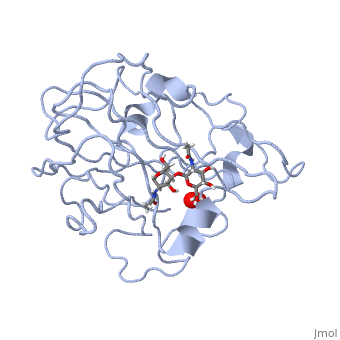5tkh
From Proteopedia
Neurospora crassa polysaccharide monooxygenase 2 ascorbate treated
Structural highlights
FunctionLPMO_NEUCR Catalyzes the oxidative cleavage of glycosidic bonds in cellulosic substrates via a copper-dependent mechanism (PubMed:22004347, PubMed:22188218, PubMed:24350607, PubMed:31431506). In the presence of an exogenous reductant ascorbic acid, degrades phosphoric acid swollen cellulose (PASC) to cello-oligosaccharides and 4-ketoaldoses, the end products oxidized at the non-reducing end (PubMed:22004347, PubMed:22188218, PubMed:24350607). Somewhat active toward tamarind xyloglucan and konjac glucomannan, with improved activity with glucomannan in the presence of PASC (PubMed:31431506). H(2)O(2) is able to substitute for O(2) in reactions with PASC, xyloglucan and glucomannan (PubMed:31431506). Very weak activity on cellopentaose (PubMed:31431506). No activity with birchwood xylan or ivory nut mannan (PubMed:31431506). Disrupts plant cell wall polysaccharide substrates, such as recalcitrant crystalline cellulose (Probable).[1] [2] [3] [4] Publication Abstract from PubMedLytic polysaccharide monooxygenases have attracted vast attention owing to their abilities to disrupt glycosidic bonds via oxidation instead of hydrolysis and to enhance enzymatic digestion of recalcitrant substrates including chitin and cellulose. We have determined high-resolution X-ray crystal structures of an enzyme from Neurospora crassa in the resting state and of a copper(II) dioxo intermediate complex formed in the absence of substrate. X-ray crystal structures also revealed "pre-bound" molecular oxygen adjacent to the active site. An examination of protonation states enabled by neutron crystallography and density functional theory calculations identified a role for a conserved histidine in promoting oxygen activation. These results provide a new structural description of oxygen activation by substrate free lytic polysaccharide monooxygenases and provide insights that can be extended to reactivity in the enzyme-substrate complex. Oxygen Activation at the Active Site of a Fungal Lytic Polysaccharide Monooxygenase.,O'Dell WB, Agarwal PK, Meilleur F Angew Chem Int Ed Engl. 2017 Jan 16;56(3):767-770. doi: 10.1002/anie.201610502., Epub 2016 Dec 22. PMID:28004877[5] From MEDLINE®/PubMed®, a database of the U.S. National Library of Medicine. See AlsoReferences
| ||||||||||||||||||||

